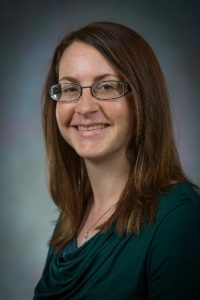 Elizabeth Meschewski is a Senior Scientific Specialist with ISTC’s Sponsored Research, Public Engagement, and Communications team. She joined ISTC in 2011 as a research assistant in the ARIES group.
Elizabeth Meschewski is a Senior Scientific Specialist with ISTC’s Sponsored Research, Public Engagement, and Communications team. She joined ISTC in 2011 as a research assistant in the ARIES group.
Beth communicates ISTC’s research and technical assistance activities by creating displays, posters, and website content. She coordinates ISTC’s Sponsored Research Program, which is funded by the Illinois Hazardous Waste Research Fund (HWRF) and oversees projects funded through HWRF. She also organizes ISTC’s Sustainability Seminar series, the Emerging Contaminants in the Environment conference, and other research related events. She received the 2019 Distinguished Support Staff Award at the Prairie Research Institute’s annual Celebration of Excellence.
How old were you when you first became interested in science? What sparked your interest?
I can’t remember what age but it was pretty early in grade school. It was my dad who got me interested in science. We have watched a lot of Nature and Nova documentaries together. We also had about 13 acres of former pasture land surrounding my childhood home. I helped my dad in various capacities converting it back to natural habitat while growing up. We had several native tree planting events where we would use a homemade giant triangle with 10 foot sides to lay out where the trees would be planted so that they wouldn’t get crowded or shaded out when they got older. We’d also “animal watch” with binoculars on the back porch in the summer or while walking “the path” through our land.
Who or what drew you to your field of study?
I knew I wanted to do something related to the environment for most of my life. I considered meteorology (tornado chaser!) and volcanology but finally settled on geology to study the whole earth. While at university, I had the opportunity to take an environmental geology class and an environmental engineering class. These both discussed the issues of hazardous waste and release of toxins to the environment and how they traveled in the environment. I think this type of science is super interesting. We can track and predict where the “bad stuff” goes so we can fix it. Now I work with people who try to prevent this problem from happening.
What is the best part of your job at ISTC and what work are you most proud of?
I think the best part is being able to learn about many different types of science. Each of my colleagues work on different ways to help us become more sustainable through technology. Then I get to read/learn about it and translate it to our website. I’m also an organizational nerd. Another aspect of my job is planning an emerging contaminants conference, which lets me geek out on all the task lists to pull off an excellent event. Keeping up with emerging contaminants science is very interesting as well.
What’s your favorite work-related memory?
 One of our projects involved converting waste plastic back into the oil from which it started. Then that oil could be converted into several different types of fuel including diesel and gasoline. To illustrate this concept, we took photos of me pretending to put a plastic bag into the fuel tank of one of our center vehicles. This photo definitely spoke a 1000 words.
One of our projects involved converting waste plastic back into the oil from which it started. Then that oil could be converted into several different types of fuel including diesel and gasoline. To illustrate this concept, we took photos of me pretending to put a plastic bag into the fuel tank of one of our center vehicles. This photo definitely spoke a 1000 words.
What are common misconceptions about your career?
When I say I work at the Illinois Sustainable Technology Center, people often follow up with “oh so you work on solar panels and wind power?” I usually have to say something like “Well, not quite”. We actually work on cutting edge technology. Like what happens to solar panels when they are broken or no longer producing power economically? We’ve started a solar panel recycling initiative. We also work on ways to create energy from waste products and investigate emerging contaminants that have unknown or little known impacts on the environment.
What do you wish more people understood about science or being a scientist?
I wish people understood that science is never done. Meaning that we might think we have a good understanding of some science today but then some discovery might be made that changes everything. We see this throughout history. One example is people used to think that the earth was a flat disk with defined edges instead of sphere, but Aristotle proposed the theory of a spherical earth with observational data – people saw different star patterns in the sky when traveling.
What advice would you give to future scientists?
Find your passion! As a scientist you can make a difference in both public and private realms. There is value in providing high quality scientific information to policy makers, taking discoveries to industry, and publishing papers.
If you could switch jobs with someone, who would it be?
I think I would be a construction worker / contractor. I’ve always liked problem solving and putting together puzzles / box furniture. Working on a construction site seems like a good combination of both (from my limited knowledge of the field).

